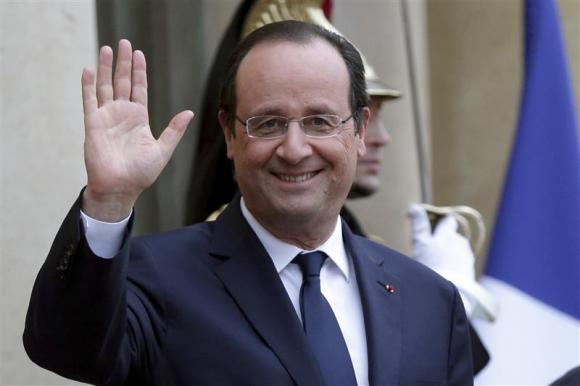(Reuters) – French business raised doubts on Wednesday over Socialist President Francois Hollande’s plan for public spending cuts and structural reform to revive the euro zone’s second largest economy.

His allies hailed a new “social democrat” vision for France but unions said they were worried about job cuts to the army of state sector workers and far-left politicians accused him of a sell-out as he moved towards the political center.
Moreover, his aides said only 49 billion euros of the 53 billion in cuts he had announced had so far been confirmed, although they promised more cuts would come.
Hollande, who has not denied magazine allegations last week of an affair with actress, deflected questions on his personal life at a marathon news conference on Tuesday unveiling plans to find at least 50 billion euros of spending cuts between 2015-2017 and cut corporate charges by 30 billion euros.
The European Commission said the moves should make French business more competitive. While France’s main employers’ group broadly welcomed the plan, it rejected his call for companies to commit to specific targets for new hires.
“What exactly is the magnitude of the structural reforms he announced? We need to have a clarification,” said Medef president Pierre Gattaz, who has suggested the French private sector could create an extra one million jobs if freed from excessive charges.
Critics say French public spending at around 57 percent of national output – some 12 points more than in neighboring Germany – is too high while the national audit office has said that French debt at 93.4 percent of GDP is “in the danger zone”.
But Hollande’s plans prompted an onslaught of criticism from France’s hard left and even from the far-right National Front’s Marine Le Pen, who said he converted to “ultra-liberal” economics.
“It’s called social democracy … and social democracy is on the left,” Finance Minister Pierre Moscovici, a centrist leader in Hollande’s Socialist Party, told LCI television.
“What is being proposed is a social compromise … it is an acceleration, an amplification of our line,” he replied when asked if Hollande – who in his 2012 campaign called the world offinance his “enemy” – had committed a U-turn.
Hollande spoke on Tuesday of 18 billion euros in spending cuts for each of 2015 and 2016 and 17 billion in 2017 for a total of 53 billion. A presidential aide said on Wednesday that spending plans so far included the full 2015 and 2016 cuts and 13 billion in cuts for 2017, for a total of 49 billion.
While that would be no more than savings already announced by Hollande’s government in previous packages, the aide said more measures were still being discussed.
“We will do more in order to ease the (tax) burden,” the official, who was speaking on condition of anonymity, said. A second source said the spending plans would be revised in the coming months after consultations with experts.
A spokeswoman for the German finance ministry said the proposals were “important” and Berlin had “a great deal of respect for the efforts and reform measures that have been announced.”
“U-TURN OF WORDS”?
For over two-and-a-half hours on Tuesday, Hollande batted away questions about a celebrity magazine’s revelations of a liaison with a French film actress and the future of his relationship with official partner Valerie Trierweiler.
The setpiece event was intended to expand on Hollande’s conviction that “supply-side socialism” is needed to reform the euro zone’s second largest economy while preserving a generous welfare model cherished by most French.
“A U-turn of words”, the right-leaning Le Figaro newspaper said in its Wednesday edition. “Hollande set free”, the left-wing Liberation daily said.
But while Hollande largely succeeded in ensuring domestic headlines focused on his economic plans rather than private life, the reaction among reform advocates was more mitigated.
The planned cuts to spending amount to some 18 billion euros a year for 2015, 2016, and 2017 – little higher than an existing rhythm set to shave 15 billion euros this year.
Moreover Hollande said the 30-billion-euro tax reduction to companies by alleviating them of the need to pay family benefit contributions by 2017 could be partly counter-financed by re-diverting 20 billion euros of existing tax credits.
“So the net win is only of the order of 10 billion euros whereas we were after 80,” said Gattaz.
Hollande’s suggestion that France could find savings by rationalizing its multi-layered system of local government also raised concerns among trade unions over the fate of some 5.3 million “fonctionnaire” public sector workers.
Budget Minister Bernard Cazeneuve said the government would not repeat an attrition policy tried out by conservative ex-leader Nicolas Sarkozy to replace only one out of two departing state sector workers.
However the moderate CFDT union that has backed Hollande’s reforms up till now warned in a statement that it would watch closely any impact on staffing levels.
Independent economists welcomed Hollande’s recognition of the need to cut spending but questioned whether the volume of cuts will be delivered and sufficient to mark a change.
“2014 could be a window of opportunity for Hollande,” said Christian Schulz, senior economist at German bank Berenberg.
“Convincing the left wing of his party and the unions of the need for supply-side reforms should be easier in times of high unemployment and economic underperformance,” he added.
Germany’s conservative Frankfurter Allgemeine Zeitung noted that Hollande had “abandoned the balancing act” within his own party by coming out as a social democrat rather than a left-leaning socialist.
But it added: “In Europe, and especially in Berlin, people will be watching closely to see if he can stay the course with his shift.”
A spokeswoman for the German finance ministry said the proposals were “important” and that Germany had “a great deal of respect for the efforts and reform measures that have been announced.”
(Additional reporting by Elizabeth Pineau in Paris and Stephen Brown and Noah Barkin in Berlin; Editing by Peter Graff, Giles Elgood and Anna Willard)





